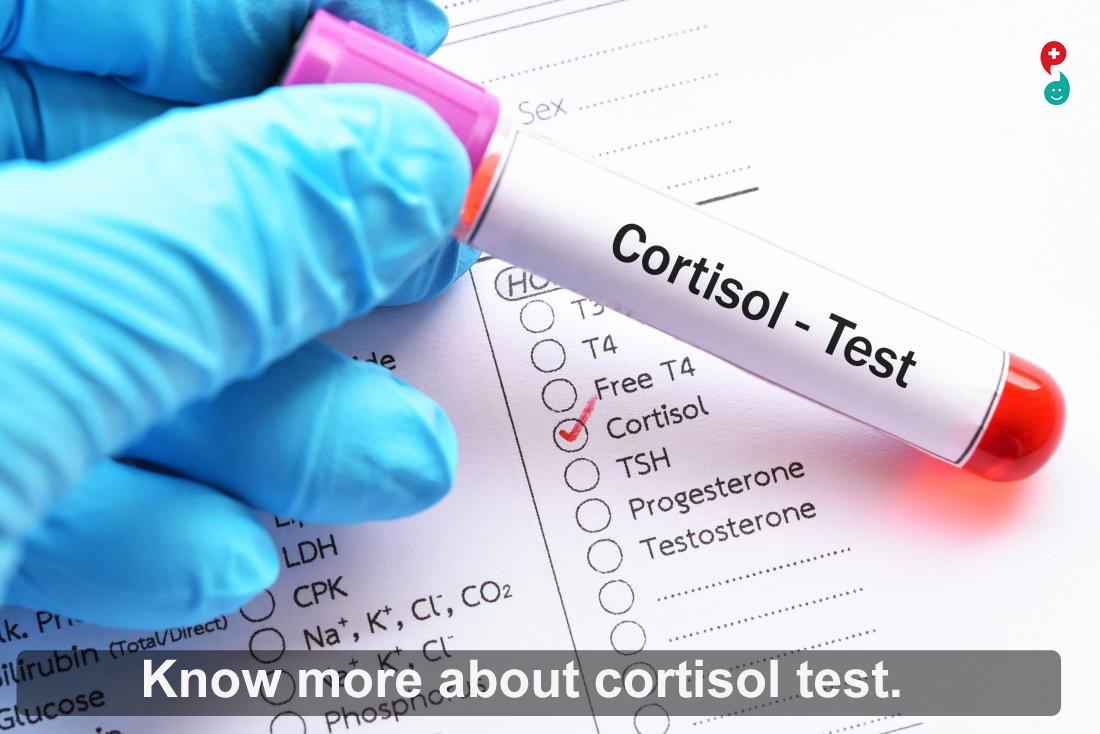
Cortisol Test
What is a Cortisol Test?
Cortisol is a hormone that affects almost every organ and tissue in your body. It plays an important role in helping you to:
Respond to stress
Fight infection
Regulate blood sugar
Maintain blood pressure
Regulate metabolism, the process of how your body uses food and energy
Cortisol is made by your adrenal glands, two small glands located above the kidneys. A cortisol test measures the level of cortisol in your blood, urine, or saliva. Blood tests are the most common way of measuring cortisol. If your cortisol levels are too high or too low, it may mean you have a disorder of your adrenal glands. These disorders can be serious if not treated.
Other names: urinary cortisol, salivary cortisol, free cortisol, dexamethasone suppression test, DST, ACTH stimulation test, blood cortisol, plasma cortisol, plasma
What is it used for?
A cortisol test is used to help diagnose disorders of the adrenal gland. These include Cushing's syndrome, a condition that causes your body to make too much cortisol, and Addison disease, a condition in which your body doesn't make enough cortisol.
Why do I need a cortisol test?
You may need a cortisol test if you have symptoms of Cushing's syndrome or Addison disease.
Symptoms of Cushing's syndrome include:
Obesity, especially in the torso
High blood pressure
High blood sugar
Purple streaks on the stomach
Skin that bruises easily
Muscle weakness
Women may have irregular menstrual periods and excess hair on the face
Symptoms of Addison disease include:
Weight loss
Fatigue
Muscle weakness
Abdominal pain
Dark patches of skin
Low blood pressure
Nausea and vomiting
Diarrhea
Decreased body hair
You may also need a cortisol test if you have symptoms of an adrenal crisis, a life-threatening condition that can happen when your cortisol levels are extremely low.
Symptoms of an adrenal crisis include:
Very low blood pressure
Severe vomiting
Severe diarrhea
Dehydration
Sudden and severe pain in the abdomen, lower back, and legs
Confusion
Loss of consciousness
What happens during a cortisol test?
A cortisol test is usually in the form of a blood test. During a blood test, a health care professional will take a blood sample from a vein in your arm, using a small needle. After the needle is inserted, a small amount of blood will be collected into a test tube or vial. You may feel a little sting when the needle goes in or out. This usually takes less than five minutes.
Because cortisol levels change throughout the day, the timing of a cortisol test is important. A cortisol blood test is usually done twice a day–once in the morning when cortisol levels are at their highest, and again around 4 p.m., when levels are much lower.
Cortisol may also be measured in a urine or saliva test. For a cortisol urine test, your health care provider may ask you to collect all urine during a 24-hour period. This is called a "24-hour urine sample test." It is used because cortisol levels vary throughout the day. For this test, your health care provider or a laboratory professional will give you a container to collect your urine and instructions on how to collect and store your samples.
A 24-hour urine sample test usually includes the following steps:
Empty your bladder in the morning and flush that urine away. Record the time.
For the next 24 hours, save all your urine passed in the container provided.
Store your urine container in the refrigerator or a cooler with ice.
Return the sample container to your health provider's office or the laboratory as instructed.
A cortisol saliva test is usually done at home, late at night, when cortisol levels are lower. Your health care provider will recommend or provide you with a kit for this test. The kit will likely include a swab to collect your sample and a container to store it.
Steps usually include the following:
Do not eat, drink, or brush your teeth for 15-30 minutes before the test.
Collect the sample between 11 p.m. and midnight, or as instructed by your provider.
Put the swab into your mouth.
Roll the swab in your mouth for about 2 minutes so it can get covered in saliva.
Don't touch the tip of the swab with your fingers.
Put the swab into the container within the kit and return it to your provider as instructed.
Will I need to do anything to prepare for the test?
Stress can raise your cortisol levels, so you may need to rest before your test. A blood test will require you to schedule two appointments at different times of the day. Twenty-four hour urine and saliva tests are done at home. Be sure to follow all the instructions given by your provider.
Are there any risks to the test?
There is very little risk to having a blood test. You may have slight pain or bruising at the spot where the needle was put in, but most symptoms go away quickly. There are no known risks to a urine or saliva test.
What do the results mean?
High levels of cortisol may mean you have Cushing's syndrome, while low levels may mean you have Addison disease or another type of adrenal disease. If your cortisol results are not normal, it doesn't necessarily mean you have a medical condition needing treatment. Other factors, including infection, stress, and pregnancy can affect your results. Birth control pills and other medicines can also affect your cortisol levels. To learn what your results mean, talk to your health care provider.
Is there anything else I need to know about a cortisol test?
If your cortisol levels are not normal, your health care provider will likely order more tests before making a diagnosis. These tests may include additional blood and urine tests and imaging tests, such as CT (computerized tomography) and MRI (magnetic resonance imaging) scans, which allow your provider to look at your adrenal and pituitary glands.







